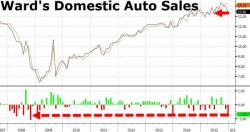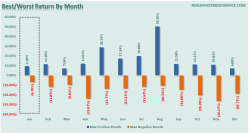GM/Ford Credit Risk Surges To 2 Year Highs As Fitch Raises Auto Sector Concerns

With the feds probing Deutsche Bank's exaggerating Auto ABS demand, car dealerships suing automakers for being forced to channel-stuff, direct evidence of massive channel-stuffing with near-record inventories-to-sales, and sales now beginning to tumble after last month's weak credit growth, it is perhaps no wonder that Fitch has raised the warning flag about automotive vehicle and parts makers...
As we demonstrated last week, the cracks are already starting to show.
Sales slowing dramatically...

